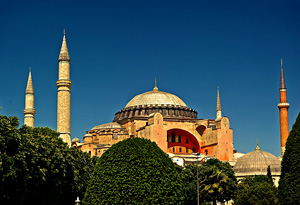Green Faith

Photo: Kenneth Nakano
On a recent trip to Turkey, Simran Sethi saw firsthand how a secular nation with religiously devout citizens can be part of the environmental revolution.
"Whatever you do, please don't tell people to 'go green' because it's the right thing to do...appeal to pocketbooks, explain the science, capitalize on the trend, but do not emphasize a moral imperative. Please." When I first started teaching environmental communications to students at the University of Kansas, this was my weekly refrain.Now, I feel differently.
I have spent the past four years in the middle of the country, a place that has transformed my worldview of what it means to care for the environment and live close to the land. My home is in a blue county within a red state, in a college town, surrounded by brand-new housing developments to the west, a coal plant to the north, and generations-old family farms all around the outskirts. Kansas has helped me to better understand that when it comes to the environment, there is no "us" and "them." We all have a vested interest in clean air and healthy communities, but how we manifest and prioritize these concerns is very different.
The worst way to delineate these cares is along party lines. Mother Earth now seems to belong to liberals, yet some of the most important environmental legislation in history was launched under conservative administrations—as I detailed in my audio interview with Republicans for Environmental Protection founder Martha Marks. "Right wing" and "left wing" stereotypes are not only inaccurate; they hinder progress for everyone.
So how do we transcend these ostensible differences? By reconnecting our relationship with the natural world to that which is most sacred, our faiths. I sensed this tie between environmentalism and faith on a recent trip to Turkey. A stunningly beautiful Eurasian country with one of the fastest-growing economies in the world, the people of Turkey are predominantly Muslim and the government is steadfastly secular. The separation of church and state is strong, yet there is a cultural undercurrent of something that connects everyone together. The call to prayer five times a day offers a reminder of something bigger than daily life. And environmental engagement, though not directly tied to Islam, seems also to be woven into the fabric of people's lives.
The green faith movement, which emphasizes environmental stewardship (in Christianity) and a call to heal the world (Judaism's tikkun olam), seems to be gaining momentum worldwide—perhaps because it taps into what author and pastor Joel Hunter identifies as "fundamentals that are important to us all." I interviewed him for my book on the barriers to environmental engagement and, again, I've come to understand why connecting environmentalism to our values and cares isn't only ideal—but essential. When we all establish this link for ourselves, it can unite us, rather than tear us apart.
Listen to a portion of my interview with Hunter.
Simran
Simran Sethi is an award-winning journalist and associate professor at the University of Kansas School of Journalism and Mass Communications. For more information on Sethi, visit SimranSethi.com and follow her on Twitter @simransethi.
Keep Reading:
What would Jesus recycle? Preaching the gospel of green
Two men trying to bring science and religion together
The power of guilt in getting us to do good



